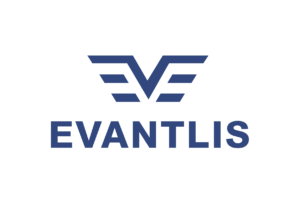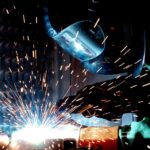Essential Tips for Choosing the Right Industrial Fasteners
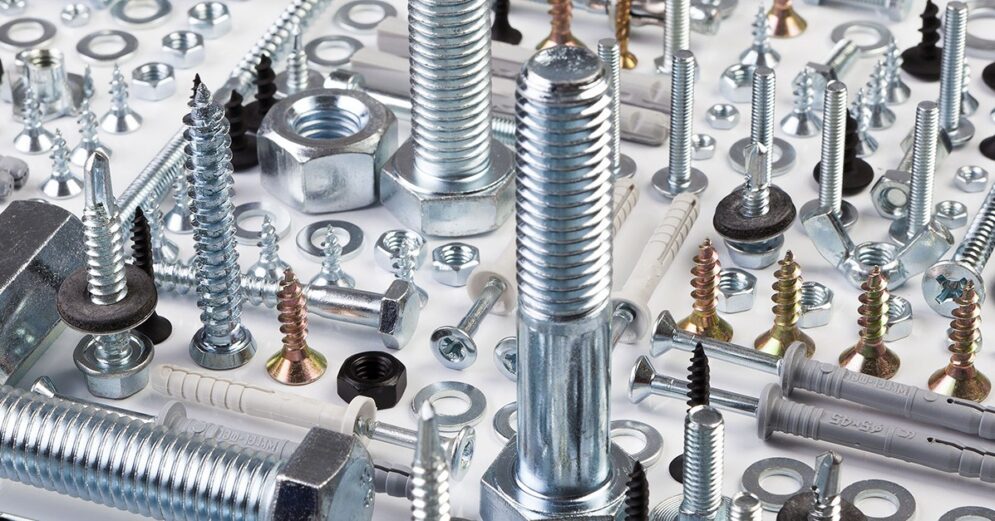
Assessing Load Requirements: Determining Your Project’s Needs
Evaluating load demands helps you guarantee that your project is sustainable, safe, and productive. Now, let’s get into how you can assess your load requirements and select the appropriate industrial fasteners.
Whether you’re working with specialty hardware or picking the perfect uncoated black bolts, this guide has you covered.
Understanding Your Project’s Load Requirements
First things first, you have to know the nature of loads that your project will handle. Is it a static load as in the case of a shelf that supports books or a live load as in the case of a swinging gate? This is important because knowing the type of load will enable you to select the right industrial hardware. A static load is constant and does not change while a dynamic load is one that changes in both magnitude and direction.
For example, if you are designing a bridge or a tall building, you are working with dynamic loads of a higher order. These loads can considerably affect the kind of nuts bolts and washers to be used. Remember, safety first!
Calculating Load Requirements
In order to determine the load requirements, it is necessary to take into account the weight and forces in your structure. Begin by calculating the total amount of load that is required to be carried by your project. This comprises the self-weight of the structure and other loads that the structure will be required to support.
For instance, when constructing a deck, determine the weight of the decking material, the furniture, and the possible number of people that could occupy the deck. You can consult the reference standards like the ASTM specifications to find out the correct load bearing capacities for your materials. Applying these standards makes your computations credible and correct.
Choosing the Right Fasteners
When the load requirements are well established, it is now time to select the appropriate fasteners. This step is important because the selection of the wrong industrial fasteners can be catastrophic as it could result in failure of structure integrity. As for nuts bolts and washers, it is crucial to pay attention to the material, size, and grade.
Material Matters
Each project is unique and it calls for different materials to be used. In outdoor projects, the use of stainless steel fasteners is recommended because they do not corrode easily. Stainless steel is also very sturdy and can therefore support heavy loads. On the other hand, for indoor projects where corrosion is not a major issue, you may use black bolts without coatings since they give the project a neat look.
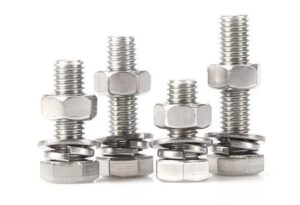
Size and Grade
The size of the fasteners you choose should be in proportion to the load that is needed in the particular project. Tensile strength is used to grade the fasteners. For example, Grade 5 bolts are frequently used in cars and Grade 8 bolts are used in areas of higher stress since they have higher tensile strength.
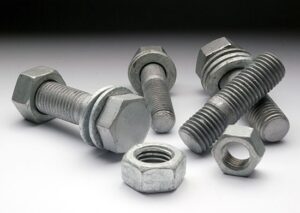
In case of any uncertainty, consult standards like ISO 898-1, dealing with mechanical properties of bolts, screws, washers, nuts, and rivets made of carbon steel and alloy steel. This helps in ensuring that one is choosing fasteners that will be able to withstand the specific stresses that they are likely to encounter.
Specialty Hardware for Unique Projects
Sometimes, your project might require specialty hardware.
Marine Construction
When it comes to marine construction, structures are in direct contact with corrosive and salty environments, and thus, require specialty hardware made of silicon bronze or stainless steel fasteners. These materials corrode much slower than the regular steel, thus making them appropriate for docks, piers, and boats.
Renewable Energy Projects
In the case of wind turbines, fasteners have to endure vibration and stress all the time. Such conditions are expected on specialty hardware like high-tensile bolts and self-locking nuts. They make sure that the turbines are firmly fixed in place despite the shaking and the storms.
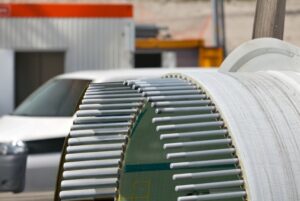
Aerospace Engineering
In aerospace engineering, the application of industrial fasteners has to be strong enough to withstand the forces acting on it and at the same time, the weight of the fasteners has to be as low as possible. Titanium fasteners are widely employed because they have high strength to weight ratio.
Historical Building Restoration
When restoring historical buildings, it’s often necessary to use specialty hardware that matches the original construction techniques and materials. Custom-fastener systems or specially treated options like blue bolts can be used to maintain the aesthetic and structural integrity of these treasured structures.
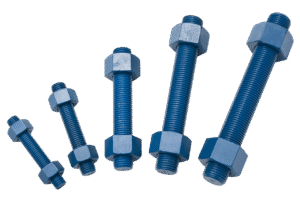
Some of the tips that may be of help in selecting industrial fasteners are as follows:
Double-Check Load Calculations: Before you go to the final selection of your fasteners, you should double check your load calculations. In this case, it is advisable to be cautious than to be regretful later on.
Consult Experts: If in any case, you are unsure of the next step to take, it is advisable to seek the help of a structural engineer or a professional.
Quality Over Cost: Purchasing better quality industrial fasteners may be costly in the short run but it is worth it in the long run.
Whether you’re using stainless steel fasteners for outdoor durability or black bolts for an indoor aesthetic project, making informed decisions will help your project succeed.
Corrosion Resistance in Fasteners
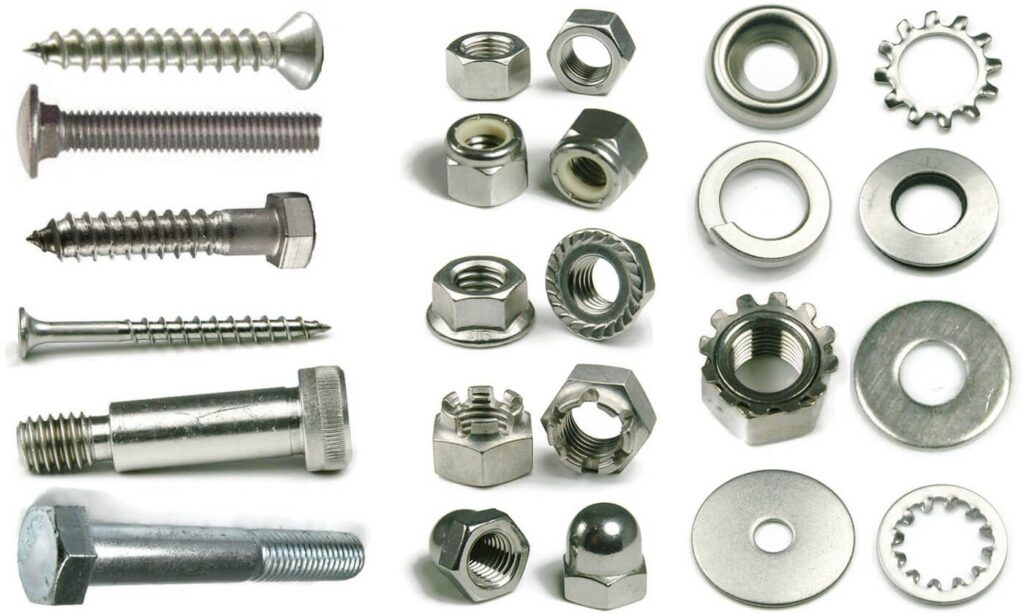
It is important for one to learn the fundamental of corrosion resistance.
In the case of industrial fasteners, corrosion resistance remains one of the most important factors. Imagine your project is a puzzle, and each fastener is a critical piece. If one piece corrodes, the whole puzzle can fall apart.
Corrosion resistance is, therefore, the ability of a material to resist the effects of oxidization and other chemical reactions that may affect it over time. This is important in ensuring that structures and longevity of projects are well maintained especially in harsh conditions.
Industrial fasteners such as black bolts, blue bolts, or for that matter stainless steel fasteners come with various coatings and materials designed to fight corrosion.
For instance, stainless steel fasteners are preferred because they do not corrode or oxidize easily like other fasteners. They contain chromium which reacts with oxygen in the environment to form a thin layer of chromium oxide on the surface which prevents the material beneath from corroding further.
Guidelines on Choosing the Right Fasteners for Corrosion-Prone Areas
Selecting the right fastener also depends on the environment i.e is the location where the fastener is to be used. If you are working in coastal regions or a region with high humidity then the use of fasteners like stainless steel bolts, stainless steel washers, and stainless steel rivets is recommended since they are highly resistant to rust. Look for grades such as 304 or 316 stainless steel. Grade 316, in particular, offers better resistance to chlorides and acids, making it perfect for marine applications.
When working in industries that involve the use of chemicals for instance in a chemical industry, there are fasteners with special coatings. Hot dipped galvanized or Zinc plated nuts bolts and washers can offer enhanced protection. These coatings are sacrificial in nature and get corroded before the metal substrate begins to corrode. It is always important to verify the coating thickness and its conformity to some standards like ASTM A153 for Hot dip galvanizing.
Real-Life Cases and Recommendations
A great example of using the right industrial fasteners in harsh environments is the construction of offshore oil rigs. These structures are subjected to seawater and high winds all the time. Stainless steel fasteners, especially grade 316, are preferred by engineers because of their excellent resistance to saltwater corrosion. Also, they employ stainless steel studs and stainless steel washers to fasten heavy machineries to guarantee that the rig will function effectively under pressure.
In civil construction projects especially in urban areas where pollution enhances the rate of corrosion, on many occasions black bolts coated with black oxide is used which offers a moderate degree of rust protection and is usually followed by wax or oil to increase its level of protection.
Key Specifications and Standards
When choosing industrial hardware, always refer to relevant standards and specifications. For instance, ASTM F593 gives the mechanical and chemical properties of stainless steel fasteners while ISO 3506 provides properties of stainless steel bolts, stainless steel rivets, and stainless steel studs. Understanding these standards helps you get industrial fasteners that have been benchmarked to some of the highest standards of quality and performance.
Maintenance Tips for Prolonging Fastener Life
However, even with the best materials, it is important to ensure that fasteners are maintained properly to increase their life span. It is recommended that fasteners should be checked frequently for any sign of corrosion or wear especially in areas of high usage. It is recommended to use anti-seize compounds to threads to avoid galling and corrosion, especially in stainless steel bolts and nuts. Also, during installation, it is necessary to apply the right amount of torque to prevent the fasteners from being overstressed and therefore lead to premature failure.
So, next time you’re in your fastener warehouse, remember these tips and choose wisely to ensure the success and longevity of your projects.
Compatibility with Different Materials
One of the most important aspects that should be considered when selecting the proper type of fasteners is their compatibility with different materials. The fasteners are matched to materials such as steel, aluminum, and composites to guarantee that the connection is strong and will not fail under stress or in different conditions.
Steel: The Spine of Construction
Steel is widely used in construction projects since it is strong and can last for a long time. When working with steel, you want to match it with equally strong fasteners. Stainless bolts are your best friends here. Stainless bolts also provide better protection against corrosion, and this is very important in applications where structures are exposed to extreme conditions. For example, in marine applications where the steel structures are exposed to salt water, stainless bolts conforming to ASTM A193 are used.
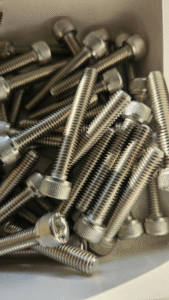
Threaded bars, also known as all thread rods, are another essential component when working with steel. They are versatile and can be cut to length for various applications. For structural purposes, consider Grade 8.8 threaded bar, compliant with ISO 898-1, to provide high tensile strength, making them suitable for heavy-duty applications.

Aluminum: Lightweight Yet Strong
Aluminum is preferred for its low density and high corrosion resistance which makes it suitable for aerospace and automotive applications However, due to its softer nature, choosing the right fasteners is critical. To avoid this type of corrosion, fastener distributors advise using fasteners made of aluminum to avoid galvanic corrosion. For example, the anodized aluminum rivets that meet ASTM B316 standard are ideal to use since they are compatible and durable.
Copper rivets are also suitable for use with aluminum when designing or constructing a product. They offer a firm hold and are relatively simple to use when fixing them in place. Copper rivets are particularly advantageous in applications where there is a high level of corrosion, for example in electrical boxes.
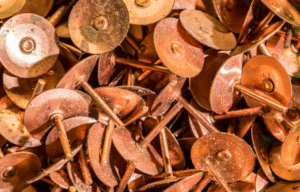
Composites: Modern Engineering Marvels
Fiber reinforced composites are being applied in many industries because of their high strength to weight ratio and flexibility. When joining the composite material, one has to ensure that the fasteners used do not cause any harm to the material. J bolts are a good optionl here because they provide firm fixing points without having to penetrate the composite material.
In critical applications, it is essential to use nut bolts and washers of compatible material. The fastener service providers prefer some grades of stainless steel or titanium fasteners for composites to have both strength and durability. In these cases, beveled washers are helpful because they spread the load more evenly and minimize stress on the composite material.
The Role of Washers: Small but Noteworthy
Washers are considered to be an insignificant component of industrial hardware assemblies but are very important. Square washers are especially helpful when the material to be drilled is soft such as aluminum or composites. They offer a greater projected area and thus minimize the chances of pull-through or material failure.
Washers for screws, especially in high-stress applications, should comply with standards like ASME B18.22.1 to ensure reliability. Beveled washers, used under square head bolts or in angled installations, help maintain the integrity of the connection, preventing loosening under dynamic loads.
Real-World Engineering Examples
Imagine designing a state-of-the-art pedestrian bridge that incorporates both steel and composite materials. In such a project, choosing the correct industrial fasteners is paramount to ensure safety, durability, and structural integrity.
Stainless steel bolts play a pivotal role in securely joining the steel sections of the bridge. These bolts, meeting ASTM A193 standards for high strength and corrosion resistance, are essential for withstanding environmental factors such as moisture and varying temperatures.
For attaching composite panels, J bolts prove to be an excellent choice. Engineers opt for this specialized fastener to provide a secure grip without compromising the integrity of the composite material..
To secure load-bearing components effectively, a threaded bar works to be an efficient option. They are utilized throughout the bridge’s construction. These bars, meeting ISO 898-1 specifications for mechanical properties and durability, provide robust support while allowing for precise adjustments during assembly.
To mitigate any potential stress concentrations and enhance the overall longevity of the structure, engineers strategically use beveled washers designed to distribute loads evenly and reduce the risk of material fatigue.
In wind energy projects, like the construction of wind turbines, selecting the right fasteners is crucial for durability and operational efficiency.
Stainless steel bolts are used to secure the robust steel tower sections of wind turbines. These bolts, meeting ASTM A193 standards, offer strong resistance to corrosion and mechanical stress, ensuring the stability and longevity of the turbine structure exposed to harsh weather conditions.
Specialized fasteners, such as turbine blade bolts and flange nuts, are critical for assembling the turbine blades and hub. These fasteners, designed to withstand high winds and dynamic loads, ensure secure attachment and operational safety of the turbine rotor assembly.
Threaded rods are employed to fasten critical components like the nacelle and yaw system. These rods, compliant with ISO 898-1 standards, provide strong support and alignment precision, essential for the reliable operation of the turbine in varying wind conditions.
To prevent stress concentrations and enhance the durability of turbine connections, beveled washers are utilized. These washers distribute loads evenly and reduce the risk of material fatigue.
Fastener Standards and Certifications: Ensuring Quality and Compliance
From U bolts to all thread rods, nuts bolts and washers, understanding fastener standards and certifications is critical. This discussion will delve into ISO, ANSI, ASTM A325, and other pertinent standards, equipping you with the knowledge to ensure quality and compliance in your engineering endeavors.
The Importance of Standards:
Complying with Specifications or standards are the foundational blocks of quality, safety or reliability in fastener manufacturing. As a result, fastener companies and manufacturers must adhere to the mentioned standards to ensure their products will deliver as expected under certain conditions. Though the standards are derived from ISO, ANSI, ASTM etc. these specifications are the universal language providing reliability in the specifications of industrial fastener.
Consider the potential failure of fasteners in a high-stakes construction project. Such failures could lead to catastrophic structural failures. Hence compliance to standard practices such as ISO 898-1 and ANSI/ASME B18. 2. 1 is therefore indispensable. These standards specify the key characteristics of size, material and mechanical requirements which every single fastener must adhere.
ISO Standards:
The International Organization for Standardization (ISO) develops global standards that ensure components are interchangeable, reliable, and safe. ISO 898-1, for instance, specifies the mechanical properties of fasteners made from carbon steel and alloy steel, ensuring uniformity in performance across manufacturers.
The ISO standards are important for fastener service providers with international operations. For instance, ISO 4014 sets out the characteristics of hexagon head bolts and means that an M8 bolt produced in Germany will be as good as an M8 one made in Japan.
ANSI Standards: Designed to Specifications Dominantly the United States
The American National Standards Institute (ANSI) develops standards tailored to the needs of the U.S. market. While often aligned with ISO, ANSI standards address specific domestic requirements. ANSI/ASME B18.2.1, for example, outlines the dimensional standards for hex bolts and screws, ensuring manufacturing consistency and application suitability within the U.S.
ASTM Standards: Material and Testing Excellence
The American Society for Testing and Materials (ASTM) is an organization that deals with material properties and testing procedures that are essential in determining whether the industrial hardware chosen can handle the required stresses and conditions. For instance, ASTM A325 outlines the requirements for structural steel bolts that are intended for use in construction projects and ensures that bolts have adequate tensile strength and hardness.
Selecting fasteners that meet ASTM standards is a way to go for obtaining fasteners with confirmed quality and reliability. Fastener manufacturers adhering to ASTM standards undergo rigorous testing to ensure compliance with material and performance specifications. This is especially critical for high-stress applications like nuts bolts and washers in structural engineering.
Compliance in Fastener Services
For fastener service providers, standards are not just a set of rules that must be followed but it is a way of creating credibility. Fastener companies that can prove they are compliant with international standards enhance their reputation and increase the market share.
Standards also drive innovation within the fastener industry. Manufacturers continually refine their products to meet evolving standards, resulting in enhanced performance and novel solutions.
Whether your project involves creating a new type of all thread rod, or enhancing the strength of U bolts, standards are a guide to innovation and improvement.

Real-World Example: Automotive Industry
For automotive fasteners, the manufacturers have to provide parts that meet certain specifications to meet the requirements of car safety and reliability. It is necessary to consider a particular example to realize the importance of these standards.
Scenario: High-Performance Engine Assembly
Think of the construction of a high-performance engine for a sports car. It is required to withstand high temperatures, vibrations, and dynamic loads of the engine. Fasteners used in such an application are subject to rigorous standards to ensure reliability and safety.
Fastener Selection: Meeting ISO 898-1
The engine assembly calls for the application of high tensile bolts for holding parts such as cylinder head to the engine block. These bolts must meet the ISO 898-1 standard that defines the mechanical characteristics of the carbon steel and alloy steel fasteners including tensile strength, yield strength and elongation.
ISO 898-1 guarantees that an M10 bolt that is used in the engine assembly has a tensile strength of 800 N/mm2 as a minimum and a yield strength of 640 N/mm2. These properties are important to be able to handle the pressure and temperature that is exerted on these parts within the engine without bending or breaking.
Testing and Verification: ASTM Standards
However, other standards such as the ASTM standards like the ASTM A325 are also used to check the quality of the fasteners. ASTM A325 defines the chemical and physical characteristics of structural bolts and the methods of testing them.
For the engine bolts, tensile tests, hardness tests and fatigue tests are performed by the fastener manufacturer as per ASTM specifications. These tests guarantee that each bolt is capable of withstanding the cyclic loads that accompany operation of the engine without suffering fatigue failure.
Real-World Impact: Safety and Performance Assurance
Suppose there is a situation where an unapproved bolt is fitted in the assembly of an engine. At high rpm the bolt could fail due to low tensile strength or poor fatigue life, which would cause a catastrophic engine failure. One such occurrence can lead to serious accidents and possibly the loss of lives of the driver and passengers.
By adhering to ISO 898-1 and ASTM A325 standards, fastener manufacturers ensure that their products can withstand the extreme conditions of high-performance engines. This compliance not only guarantees safety but also enhances the performance and reliability of the vehicle.
Conclusion
Choosing the right industrial fasteners is critical for the success and longevity of engineering projects. By assessing load requirements, calculating accurate load demands, and selecting appropriate fasteners based on material, size, and grade, you can ensure structural integrity and safety.
Compliance with standards such as ISO 898-1, ANSI, and ASTM is essential for maintaining quality and reliability. Specialty hardware for unique applications, such as marine construction, renewable energy, and aerospace engineering, further underscores the importance of informed fastener selection.
Remember, the right fasteners not only support your project but also enhance its performance and durability in demanding environments.

